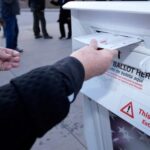The world's third-richest man sold his Bombardier Global 7500 to avoid the Twitterverse tracking his every move as he flew around the world.
French businessman Bernard Arnault, the owner of the luxury-goods company LVMH, told French commercial radio station Radio Classique that he sold the Bombardier Global 7500, the largest business jet on the market, after social media accounts on Twitter, such as "I Fly Bernard" and "Bernard's Airplane" tracked the billionaires every move and pointed out how much pollution he was generating.
One Twitter account pointed out Arnault's private jet had ceased to be registered in France:
"Still no word from either Bernard Arnault or LVMH on the subject of private jets," Bernard's Airplane recently tweeted. "So Bernard, are you hiding?"
Le jet privé de LVMH n'est plus immatriculé en France depuis le 1er septembre 2022.
— laviondebernard (@laviondebernard) September 10, 2022
Toujours aucun mot de Bernard Arnault ni de LVMH sur le sujet des jets privés.
Alors Bernard, on se cache ? pic.twitter.com/dt5Oajw8zK
So here's what happened to the plane:
"Indeed … the group [Moët Hennessy Louis Vuitton or LVMH] had a plane, and we sold it. The result now is that no one can see where I go because I now rent planes," Arnault told Radio Classique.
Arnault is the third richest person in the world, with a net worth of about $135 billion, according to the Bloomberg Billionaires Index.
Arnault's son defended using private jet travel for 'work purposes':
"This plane is a work tool," he told France 5's C à Vous. "Our industry is hyper-competitive," and a private jet gives executives an edge in traveling worldwide at a moment's notice.
His son did say in an interview with his father on Radio Classique that people tracking their private jet is bad for business:
"It's not very good that our competitors can know where we are at any moment," he said. "That can give ideas, it can also give leads, clues."
As we've pointed out over the years, tracking the private jets of CEOs is nothing new in the hedge fund industry. There are services that some traders pay upwards of $100k to retrieve flight data of the movements of dealmakers.
Quandl, a flight tracking company that sells data to hedge funds, noticed a private jet several years ago that flew to Omaha, Nebraska, home of billionaire investor Warren Buffett. Traders who had access to this data saw that representatives of Occidental Petroleum might be in talks with Buffett.
Days later, Buffett's Berkshire Hathaway infused Occidental with $10 billion cash to proceed with its $38 billion cash and stock offer for Anadarko.
But it was earlier this year that 19-year-old Jack Sweeney, who created "Elon Musk's Jet" to track the private jet movements of the world's richest man, Elon Musk, via a Twitter bot, brought flight tracking mainstream.
Arnault's move to sell the $73 million jet to rent so he can't be tracked could be a trend for billionaires and dealmakers to fly under the radar.
The world’s third-richest man sold his Bombardier Global 7500 to avoid the Twitterverse tracking his every move as he flew around the world.
French businessman Bernard Arnault, the owner of the luxury-goods company LVMH, told French commercial radio station Radio Classique that he sold the Bombardier Global 7500, the largest business jet on the market, after social media accounts on Twitter, such as “I Fly Bernard” and “Bernard’s Airplane” tracked the billionaires every move and pointed out how much pollution he was generating.
One Twitter account pointed out Arnault’s private jet had ceased to be registered in France:
“Still no word from either Bernard Arnault or LVMH on the subject of private jets,” Bernard’s Airplane recently tweeted. “So Bernard, are you hiding?”
Le jet privé de LVMH n’est plus immatriculé en France depuis le 1er septembre 2022.
Toujours aucun mot de Bernard Arnault ni de LVMH sur le sujet des jets privés.
Alors Bernard, on se cache ? pic.twitter.com/dt5Oajw8zK
— laviondebernard (@laviondebernard) September 10, 2022
So here’s what happened to the plane:
“Indeed … the group [Moët Hennessy Louis Vuitton or LVMH] had a plane, and we sold it. The result now is that no one can see where I go because I now rent planes,” Arnault told Radio Classique.
Arnault is the third richest person in the world, with a net worth of about $135 billion, according to the Bloomberg Billionaires Index.
Arnault’s son defended using private jet travel for ‘work purposes’:
“This plane is a work tool,” he told France 5’s C à Vous. “Our industry is hyper-competitive,” and a private jet gives executives an edge in traveling worldwide at a moment’s notice.
His son did say in an interview with his father on Radio Classique that people tracking their private jet is bad for business:
“It’s not very good that our competitors can know where we are at any moment,” he said. “That can give ideas, it can also give leads, clues.”
As we’ve pointed out over the years, tracking the private jets of CEOs is nothing new in the hedge fund industry. There are services that some traders pay upwards of $100k to retrieve flight data of the movements of dealmakers.
Quandl, a flight tracking company that sells data to hedge funds, noticed a private jet several years ago that flew to Omaha, Nebraska, home of billionaire investor Warren Buffett. Traders who had access to this data saw that representatives of Occidental Petroleum might be in talks with Buffett.
Days later, Buffett’s Berkshire Hathaway infused Occidental with $10 billion cash to proceed with its $38 billion cash and stock offer for Anadarko.
But it was earlier this year that 19-year-old Jack Sweeney, who created “Elon Musk’s Jet” to track the private jet movements of the world’s richest man, Elon Musk, via a Twitter bot, brought flight tracking mainstream.
Arnault’s move to sell the $73 million jet to rent so he can’t be tracked could be a trend for billionaires and dealmakers to fly under the radar.







